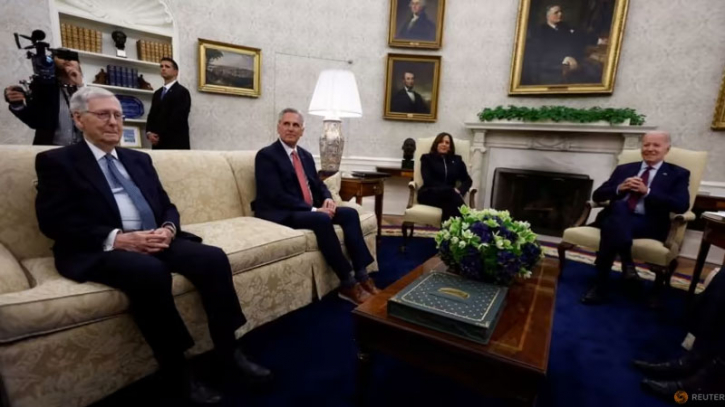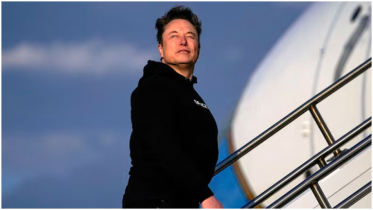Biden cuts Asia trip short; US hopeful on debt ceiling deal

Democratic President Joe Biden and top congressional Republican Kevin McCarthy edged closer to a deal to avoid a looming U.S. debt default Tuesday, as the threat of an economic nightmare prompted Biden to cut short an Asia trip this week.
After an hour of talks, McCarthy, the speaker of the House of Representatives, told reporters the two sides remained far apart on an agreement to lift the debt ceiling. But he said, "It is possible to get a deal by the end of the week. It's not that difficult to get to an agreement."
Democrats were not as positive about a quick time frame, but the White House called the meetings "productive and direct." Biden said the leaders reached "an overwhelming consensus ... that defaulting on the debt is simply not an option. Our economy would fall into recession."
"There's still work to do," Biden said at a White House event honoring Jewish Americans, saying the parties were "on a path forward to make sure that America does not default on its debt for the first time."
Biden said he was disappointed that Republicans will not consider ways to raise revenue. Raising taxes on the wealthy and companies to help pay for programs for other Americans is a key part of Biden's 2024 budget.
Biden met for about an hour with McCarthy, Senate Majority Leader Chuck Schumer, Senate Republican leader Mitch McConnell and House Democratic leader Hakeem Jeffries after their aides met over the weekend to try to strike a deal.
Republicans have refused to vote to lift the debt ceiling past its $31.3 trillion limit unless Biden and his Democrats agree to spending cuts in the federal budget. However, McConnell said after the meeting, "We know we're not going to default."
The U.S. government may default on some debts as early as June 1 unless Congress votes to lift the debt ceiling, and economists fear the country will slide into a recession.
Biden is "optimistic that there is a path to a responsible, bipartisan budget agreement if both sides negotiate in good faith and recognize that neither side will get everything it wants," the White House said.
Biden and congressional leaders' staff have met several times over the past week on the issue. Going forward, the talks will be narrowed for more engagement between House Republicans and the White House, McCarthy said.
Biden, who departs for Japan on Wednesday, said he will speak regularly with congressional leaders by phone, and the White House said he would meet with them upon his return.
White House adviser Steve Ricchetti, budget director Shalanda Young and legislative adviser Louisa Terrell will lead discussions for the administration, joining Republican Representative Garrett Graves.
Rohit Kumar, a former senior McConnell aide who is now co-leader of PwC's national tax office in Washington, said such direct negotiations had a proven track record. "It frees up the administration to make some necessary concessions that won't be popular with House and Senate Democrats but also won't imperil passage of an agreement," he said.
Neil Bradley, chief policy officer at the U.S. Chamber of Commerce, welcomed the narrower scope and structure of the talks. "We believe there is a path forward on a bipartisan deal that lifts the debt limit and makes important reforms to improve our nation's fiscal health," he said.
Continued uncertainty around the debt ceiling prompted Biden to skip stops in Papua New Guinea and Australia after he attends a Group of Seven summit of the world's richest countries in Hiroshima, Japan.
"We've got a lot of work to do in a short amount of time," McCarthy told reporters, saying the Oval Office session had set the stage for future conversations.
.png)




